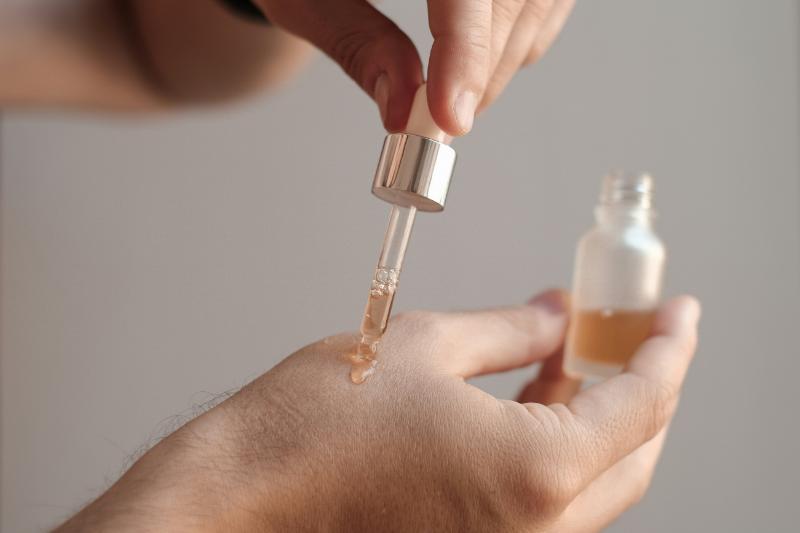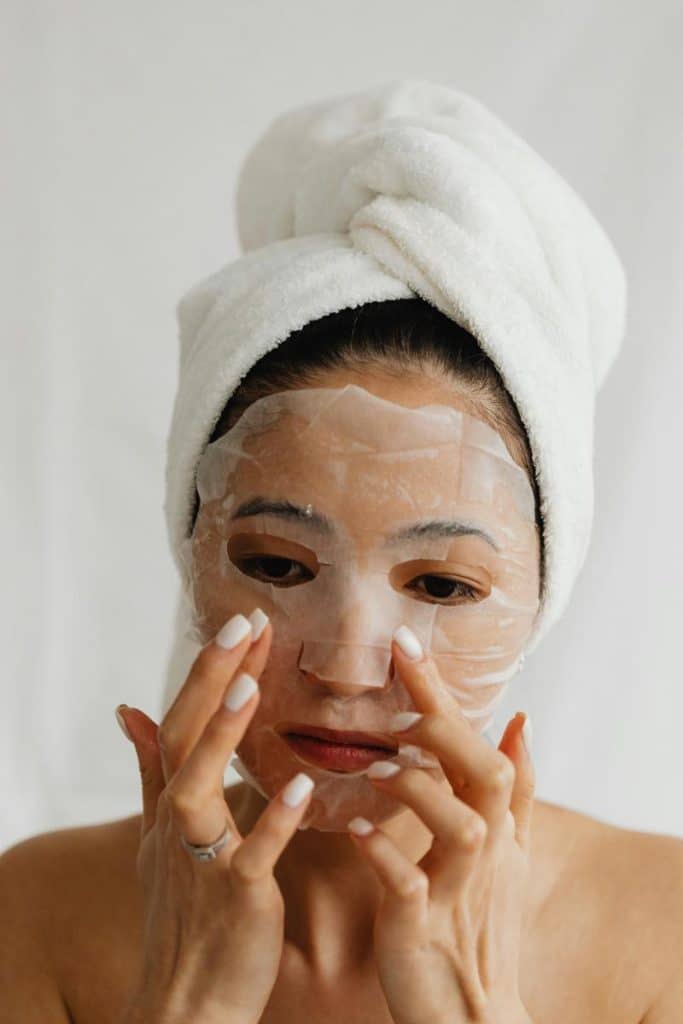Ever wondered why some people have that irresistible glow to their skin, like they’re lit from within? It’s not just about the skincare products they use on the surface; it’s also about what fuels their body. Vitamins play an essential role in keeping us healthy on the inside and making our skin look radiant and glowy on the outside.

To that end, we’ll walk through seven essential vitamins that can help you achieve that coveted glowy complexion. From the foods you should be adding to your plate to the supplements that might be worth considering, we’ve got loads of helpful tips to help you achieve the beautiful complexion you’ve always wanted.
Disclaimer: Consult with a medical professional (such as a dermatologist) before adding any supplements or skin care products to your routine.
Vitamin A: The Skin Renewal Champion
Vitamin A doesn’t always get the limelight it deserves, but it’s working hard behind the scenes to keep your skin looking its best. This powerhouse vitamin is critical for skin cell regeneration, meaning it helps your skin shed old, dull cells and replace them with fresh, new ones. The result is a smoother, more even complexion that’s less prone to breakouts and signs of aging.
But how do you get more of this nutrient into your regimen? First off, your diet can play a significant role. Foods rich in Vitamin A include sweet potatoes, carrots, dark leafy greens, and eggs.
For those considering supplements or topical treatments, retinoids are a form of Vitamin A that’s often hailed as a gold standard in skincare. Retinoids can help tackle fine lines, acne, and uneven skin texture. However, it’s important to approach them with care, as they can be potent. Starting with a lower concentration and gradually increasing it can help your skin adjust without causing irritation.
It’s also worth noting that while Vitamin A is fantastic for the skin, too much of a good thing isn’t always better. High doses of Vitamin A supplements can lead to toxicity, so it’s important to stick to recommended amounts and consult with a healthcare professional before starting any new supplement.
Vitamin C: The Antioxidant Powerhouse
Vitamin C is an immune booster and a skin care superstar. Known for its powerful antioxidant properties, Vitamin C helps fight against free radicals, reducing the impact of daily environmental stressors like pollution and sun exposure. This vitamin plays a pivotal role in collagen synthesis, which is necessary for skin elasticity and firmness. Plus, it has a brightening effect, helping to fade dark spots and even out skin tone for that radiant glow we all love.
Incorporating Vitamin C into your diet is straightforward with a variety of fruits and vegetables. Think oranges, strawberries, kiwi, bell peppers, and broccoli. For an external boost, consider incorporating a WOWMD Vitamin C serum into your skincare routine. Applying it in the morning under sunscreen can provide an extra layer of protection against UV damage. Remember, consistency is key when it comes to seeing results from Vitamin C.

Vitamin D: The Sunshine Vitamin
Often referred to as the “sunshine vitamin,” Vitamin D is synthesized in the skin through direct sunlight exposure. It’s integral for bone health, immune function, and—yes—skin health. Vitamin D plays a role in skin tone and may help reduce the risk of psoriasis, acne, and even some forms of skin cancer. However, the challenge with Vitamin D is getting just the right amount; too little can affect your health, but too much sun exposure can lead to skin damage and increase the risk of skin cancer.
To strike a balance, aim for moderate sun exposure (about 10-15 minutes of early morning or late afternoon sun, depending on your location and skin type), and consider dietary sources like fatty fish (salmon, mackerel), fortified foods, and supplements if recommended by your healthcare provider. Vitamin D supplements from your favorite supplement store can be particularly beneficial during the winter months or for individuals with limited sun exposure.
Vitamin E: The Protector
Vitamin E is the guardian of your skin, offering powerful antioxidant properties that help protect the skin from damage caused by free radicals and environmental aggressors like UV rays and pollution. This vitamin is key in supporting skin health, aiding in its natural healing process, and maintaining moisture levels for that soft, supple feel.
Rich sources of Vitamin E include nuts and seeds (like almonds and sunflower seeds), spinach, and avocados. Incorporating these foods into your diet can help you achieve your daily Vitamin E needs.
For an extra boost, look for skincare products that contain Vitamin E, particularly moisturizers and serums. When used in combination with Vitamin C, Vitamin E can enhance protection against the sun’s harmful rays, although it’s not a substitute for sunscreen. Together, they form a dynamic duo that combats skin damage and supports overall skin health.
Vitamin K: The Dark Circle Diminisher
Vitamin K is known for its role in the body’s healing process and its ability to improve blood clotting. But what makes it a standout for your skin, especially the delicate area under your eyes, is its potential to diminish dark circles. Vitamin K is believed to help with the blood circulation issues that can cause dark circles, making it a key ingredient in many eye creams.
To boost your Vitamin K intake, include green leafy vegetables like kale, spinach, and broccoli in your diet, along with meats and dairy products. While eating foods rich in Vitamin K can contribute to overall health, topical application in the form of creams is most effective for targeting under-eye circles and improving skin elasticity. It’s a specific, focused approach that can make a noticeable difference in the appearance of your eyes.
Vitamin B3 (Niacinamide): The Brightness Booster
Vitamin B3, also known as Niacinamide, can help improve the skin’s barrier function, retain moisture, reduce inflammation, and diminish the appearance of pores. Furthermore, it’s a brightening agent that works to fade dark spots and hyperpigmentation, contributing to a more even and radiant complexion.
Found in foods such as chicken, tuna, lentils, and grains, Niacinamide is easily incorporated into your diet. However, its topical application in skincare products is where it truly shines. Serums and moisturizers containing Niacinamide can be used both in the morning and evening routines to maximize its benefits. It’s compatible with most other skincare ingredients, making it a versatile addition to any regimen.
Vitamin B5 (Pantothenic Acid): The Moisture Magnet
Vitamin B5, or Pantothenic Acid, is key for skin hydration. It acts as a humectant, attracting and holding moisture in the skin, which helps to keep it soft, smooth, and healthy. This vitamin also plays a role in the skin’s healing process, aiding in the repair of the skin barrier and reducing inflammation. It’s particularly beneficial for those with dry or sensitive skin, as it can provide a soothing effect.
You can find Vitamin B5 in a wide range of foods, including mushrooms, avocados, eggs, lentils, and yogurt, making it easy to add to your diet. For targeted skin benefits, look for skincare products like serums, moisturizers, and masks that contain Vitamin B5. These products can help to deeply hydrate the skin, leaving it looking plump and radiant. Additionally, Vitamin B5 is often used in combination with other hydrating ingredients to enhance its effects.

Incorporating These Vitamins Into Your Routine
Achieving a glowy complexion through vitamins doesn’t have to be complicated. With a few simple adjustments to your diet and skincare regimen, you can nourish your skin from the inside out. Here’s how to seamlessly integrate these vitamins into your daily routine:
- Balanced Diet: Focus on a varied and balanced diet rich in fruits, vegetables, lean proteins, and healthy fats. This ensures you get a broad spectrum of vitamins and nutrients. For instance, start your day with a smoothie packed with Vitamin C-rich fruits, or add a handful of almonds to your snack for a Vitamin E boost.
- Smart Supplementation: While a balanced diet is key, supplements can help fill any nutritional gaps. Before starting any supplement, do your research and consult with a healthcare professional to determine your needs. Remember to avoid exceeding the recommended daily intake.
- Skincare Products: Look for skincare products that are formulated with these vitamins. Vitamin C serums, Vitamin E moisturizers, and creams with Niacinamide (Vitamin B3) can directly benefit your skin. Remember, it’s essential to introduce new products gradually and pay attention to how your skin responds.
- Sun Protection: Since some vitamins like Vitamin D require sun exposure, it’s crucial to balance sun intake with protection. Use a broad-spectrum sunscreen daily, even on cloudy days, to protect against UV damage while still enjoying the benefits of the sunshine vitamin.
- Consistency is Key: Like any skincare or health regimen, consistency is vital. Make these dietary and skincare practices part of your daily routine for the best results.
- Professional Advice: Finally, consider consulting with a dermatologist or nutritionist. They can offer personalized advice based on your specific skin type and dietary needs.
Navigating the world of vitamins for skin health might seem overwhelming at first, but it’s quite straightforward once you understand the role each one plays in achieving a radiant complexion. By incorporating Vitamins A, C, D, E, K, B3, and B5 into your diet and skincare routine, you can work towards a glowy complexion and invest in your overall health.
